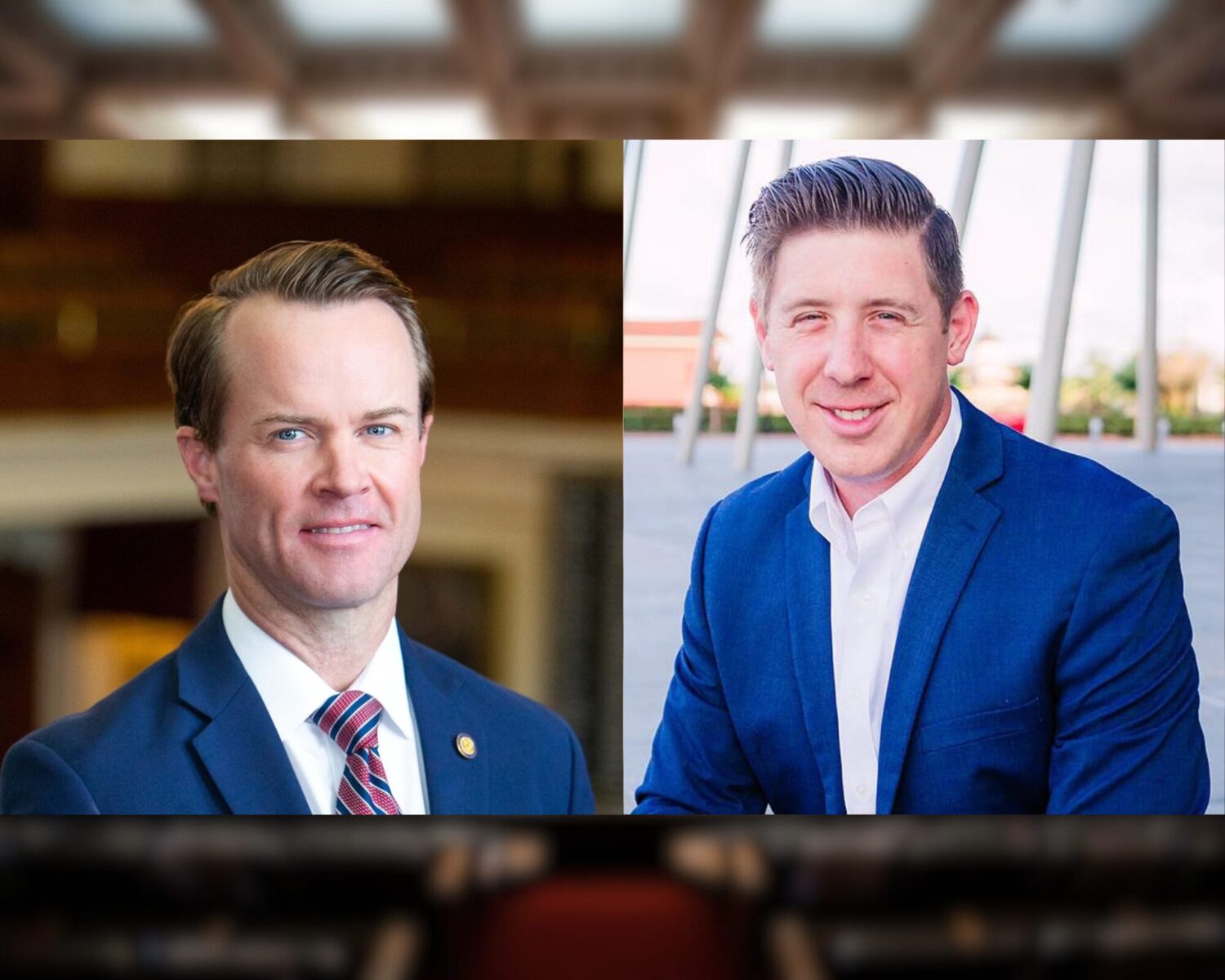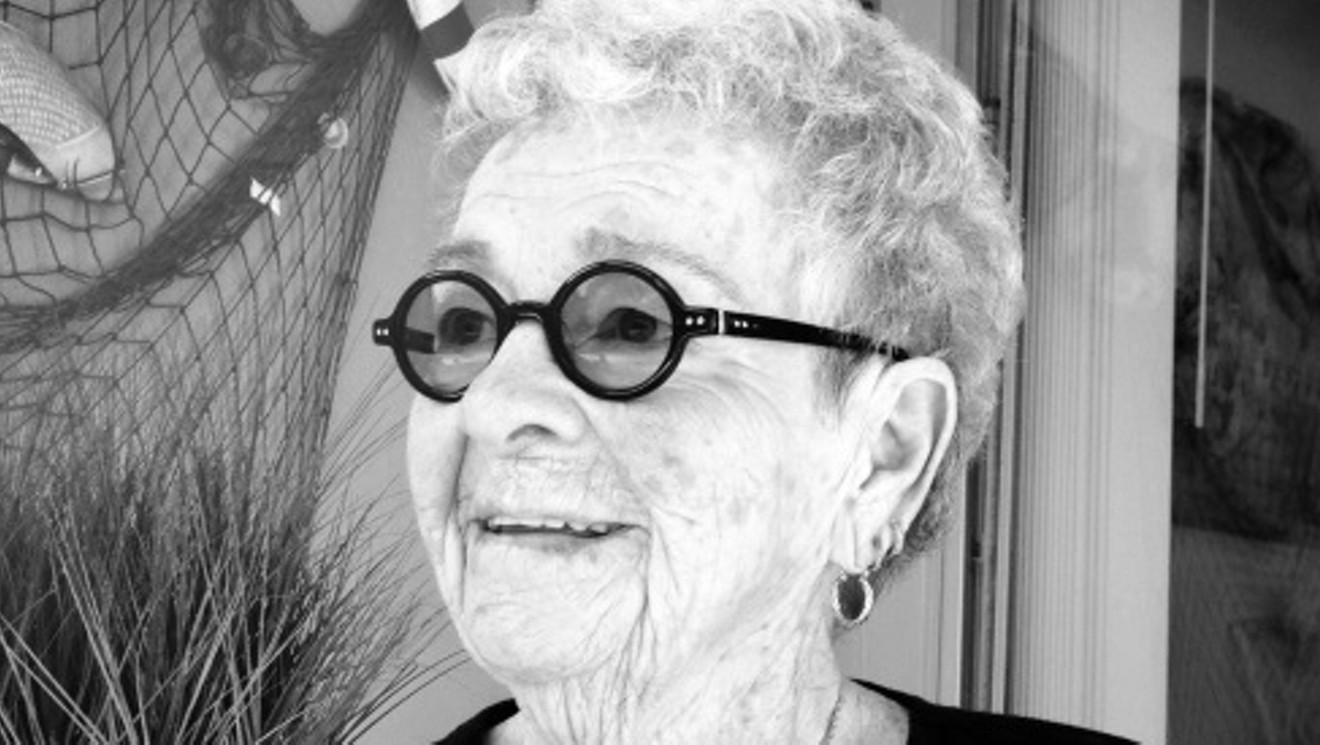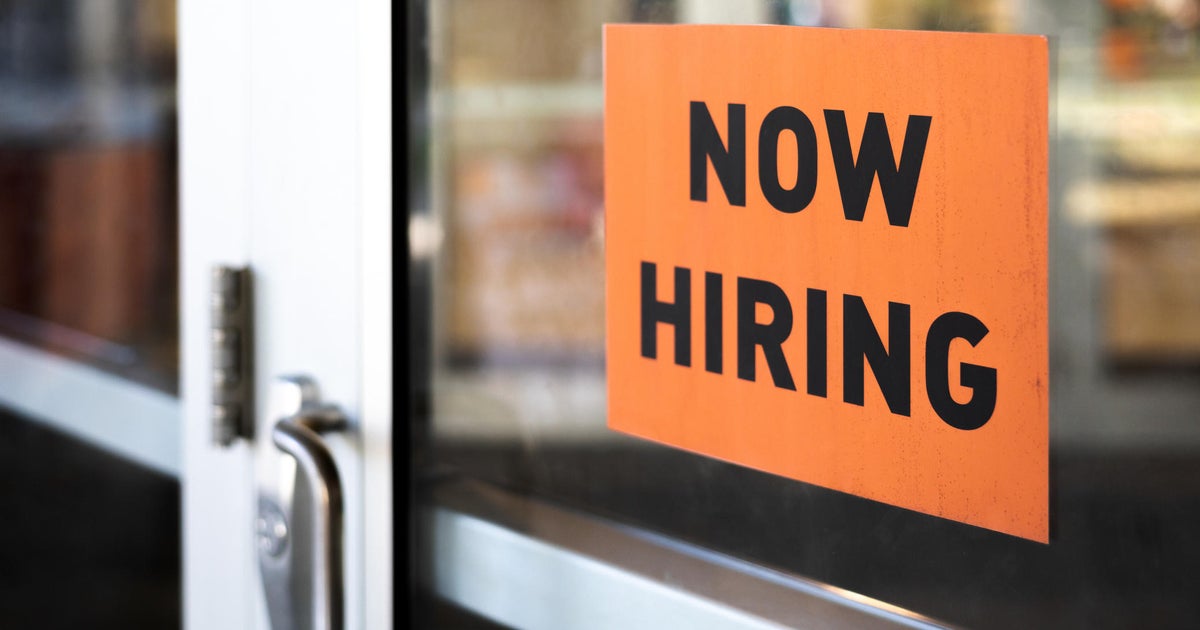Politics
LGBTQ+ people in Huntington Beach feel a growing hostility

Huntington Beach radiates California cool. The best surfers in the world descend here each summer to compete on waves rolling in under its public pier. Convertibles zoom past towering palms along Pacific Coast Highway. Beachfront homeowners enjoy breathtaking views, and everybody seems to sport a hang-loose attitude.
But trans activist Kanan Durham says Surf City USA and Orange County in general have grown more and more unwelcoming — in some cases hostile — for members of the LGBTQ+ community.
Durham, 32, joined other concerned Orange County residents to form the nonprofit group Pride at the Pier to push back against what they say is a rising tide of hate here that’s emblematic of a trend seen across the country.
When Huntington Beach’s conservative-majority City Council voted last year to ban the display of most flags on city property — including the rainbow flag, a global emblem of LGBTQ+ pride, unity and self-expression — members of the group took to the pier, waving Pride flags in protest.
Late former Huntington Beach Mayor Shirley Dettloff, center, joined a protest against the charter amendments in January.
(Allen J. Schaben / Los Angeles Times)
Their act of defiance was met with a rebuke of sorts when voters approved a measure to write the ban into the City Charter.
Given that only about 26% of registered Orange County voters cast ballots on Super Tuesday in March, Durham worries that many have stopped following local government and therefore may not realize a crisis is unfolding. He’s concerned that some will see battles over Pride flags as little more than business as usual in an era when no aspect of life seems immune from the polarization that defines U.S. politics.
No one should assume that LGBTQ+ Californians are shielded from prejudice simply because they live in a progressive state where Democrats hold sway, he says.
“California is complicated,” says Durham, executive director of Pride at the Pier. “There are a lot of people who see California as this blue bubble where this stuff doesn’t happen. They don’t realize how much danger that marginalized communities face.”
Supporters of the flag ban argue that identity- and issue-based flags are divisive in a city they insist is tolerant and inclusive.
Yet Huntington Beach has had a hard time shaking its reputation as a haven for racists and far-right extremists.
In the 1980s, its pier and downtown were well-known gathering places for skinheads. Two racially motivated killings in the ’90s prompted the creation of a task force to celebrate diversity.
Some saw an improvement in the city’s race relations as people of color became the majority in Orange County, but in 2018, police arrested four members of a Huntington Beach-based white supremacist group on charges of organizing and participating in riots. In 2022, several people in town woke up to antisemitic fliers on their front lawns that blamed Jewish officials in the Biden administration for the COVID-19 pandemic.
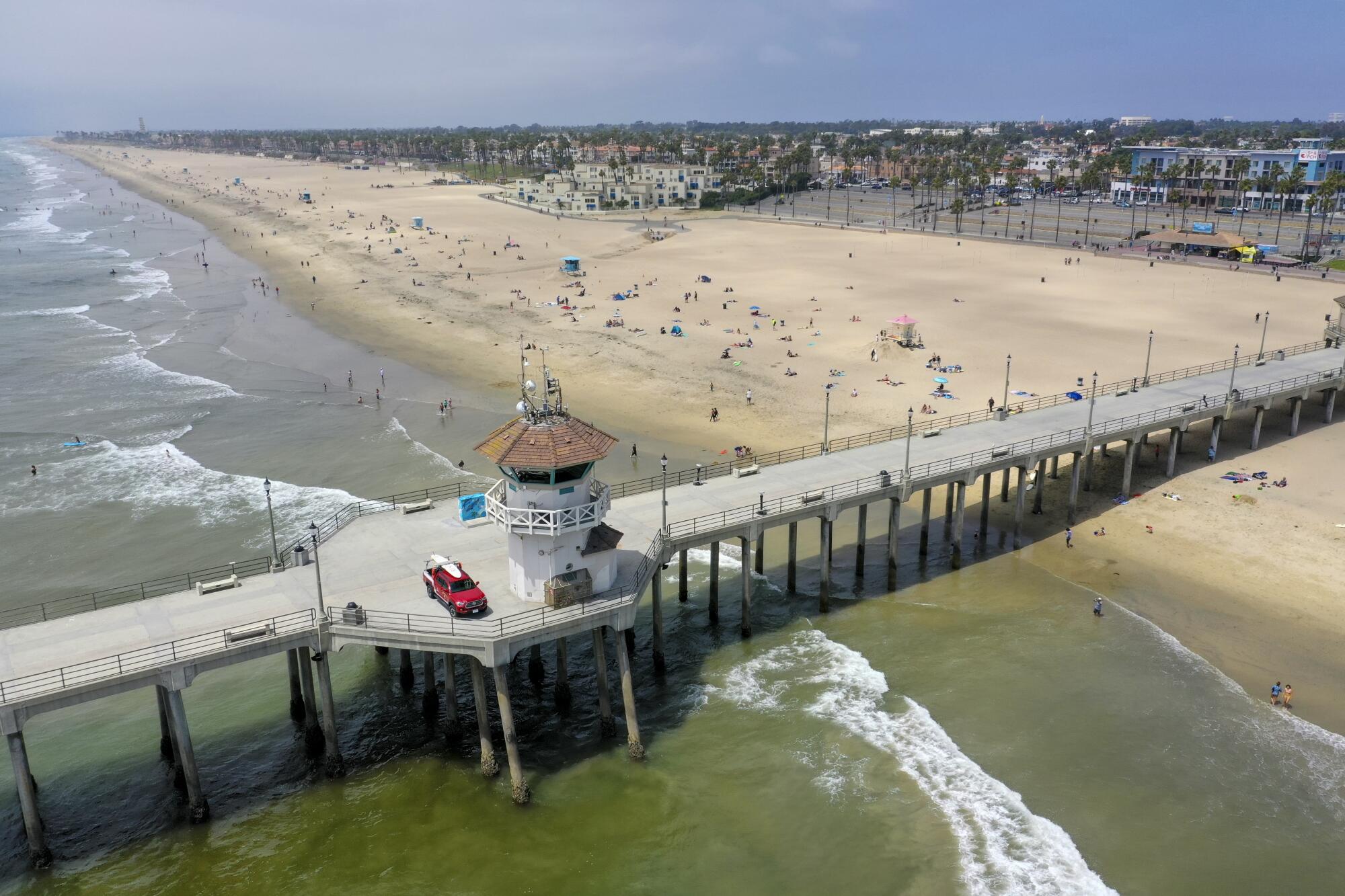
Huntington Beach became the site of demonstrations for LGBTQ+ rights after City Council members voted to stop flying the Pride flag and other banners on government property.
(Allen J. Schaben / Los Angeles Times)
If you happen to be LGBTQ+ and live or work in Orange County communities, Durham says, it’s hard not to feel singled out too.
Durham works in the service industry in Huntington Beach and lives about a 20-minute drive from its famed beaches. He declined to say where in Orange County he resides because he’s concerned about suffering retribution for speaking openly about his identity and controversial policies such as the flag ban.
This fear is widely shared, he says. Some supporters of Pride at the Pier have reached out on social media saying that while they want to attend the group’s demonstrations in Huntington Beach, they worry about being harassed or attacked over their LGBTQ+ identity.
Many want to get involved but don’t know how they as individuals can make a difference in yet another round of culture wars, says Jay Garner, a friend of Durham who has lived in Huntington Beach since 2019.
People need to understand how debilitating it can be to constantly feel as if you must fight for your right to exist and be yourself, says Garner, who identifies as nonbinary and uses they/them pronouns.
“It does weigh on me,” Garner says.
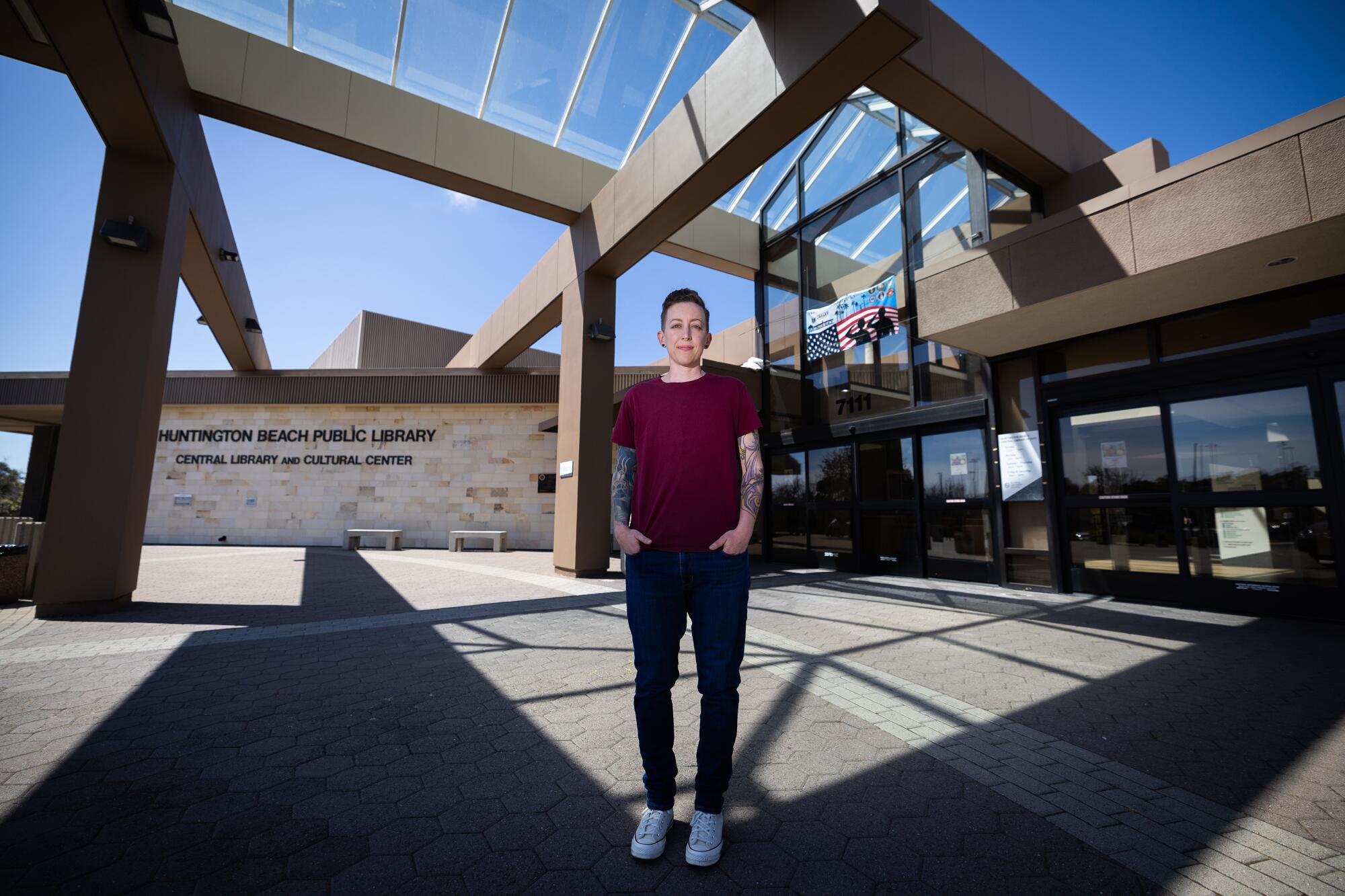
Jessamyn Garner, a nonbinary resident of Huntington Beach, has experienced hostility, including verbal abuse while walking on the street, because of their queer identity.
(Allen J. Schaben / Los Angeles Times)
Garner, 32, works as the marketing and communications director for the Orange County chapter of YIMBY Action, a nonprofit that advocates for affordable housing. They describe themselves as butch in appearance — short-cropped hair, button-down Oxfords. Looking different can be risky, even in a beach town that comes across as laid-back, they say.
“I can’t go downtown because I get harassed,” Garner says. “Walking down the street, I will get heckled by somebody who’s just driving by. … They’ll yell ‘dyke!’ I try not to escalate, because you never know which person is going to turn violent.”
Hate crimes against LGBTQ+ people in Orange County — and across California and the U.S. — have skyrocketed in recent years.
The Human Rights Campaign, a nonprofit advocacy group, has declared a “state of emergency” for LGBTQ+ Americans because hundreds of bills have been introduced in state legislatures that target gender-affirming healthcare, school textbooks that portray queer identity in a positive light, drag shows and the ability of trans Americans to use restrooms, play on sports teams or obtain driver’s licenses that match their gender identity.
In September, the Orange Unified School District unanimously approved a measure requiring schools to notify parents if a student asks to be identified or addressed as a gender that is different from the one they were assigned at birth.
California Atty. Gen. Rob Bonta has condemned similar “forced outing” policies approved last year by school boards in Temecula and Murrieta, calling them harmful to the safety and well-being of transgender and gender nonconforming youth. Temecula’s school district also banned all banners except the U.S. and state flags.
When Huntington Beach Councilmember Pat Burns introduced the flag ordinance last year, he portrayed his city as one where “we are all equal.”
“Our flags that we have, that represent our government, are what is important to unify us,” Burns said during a packed hearing on the ordinance.
Not everyone has heeded his unifying message.
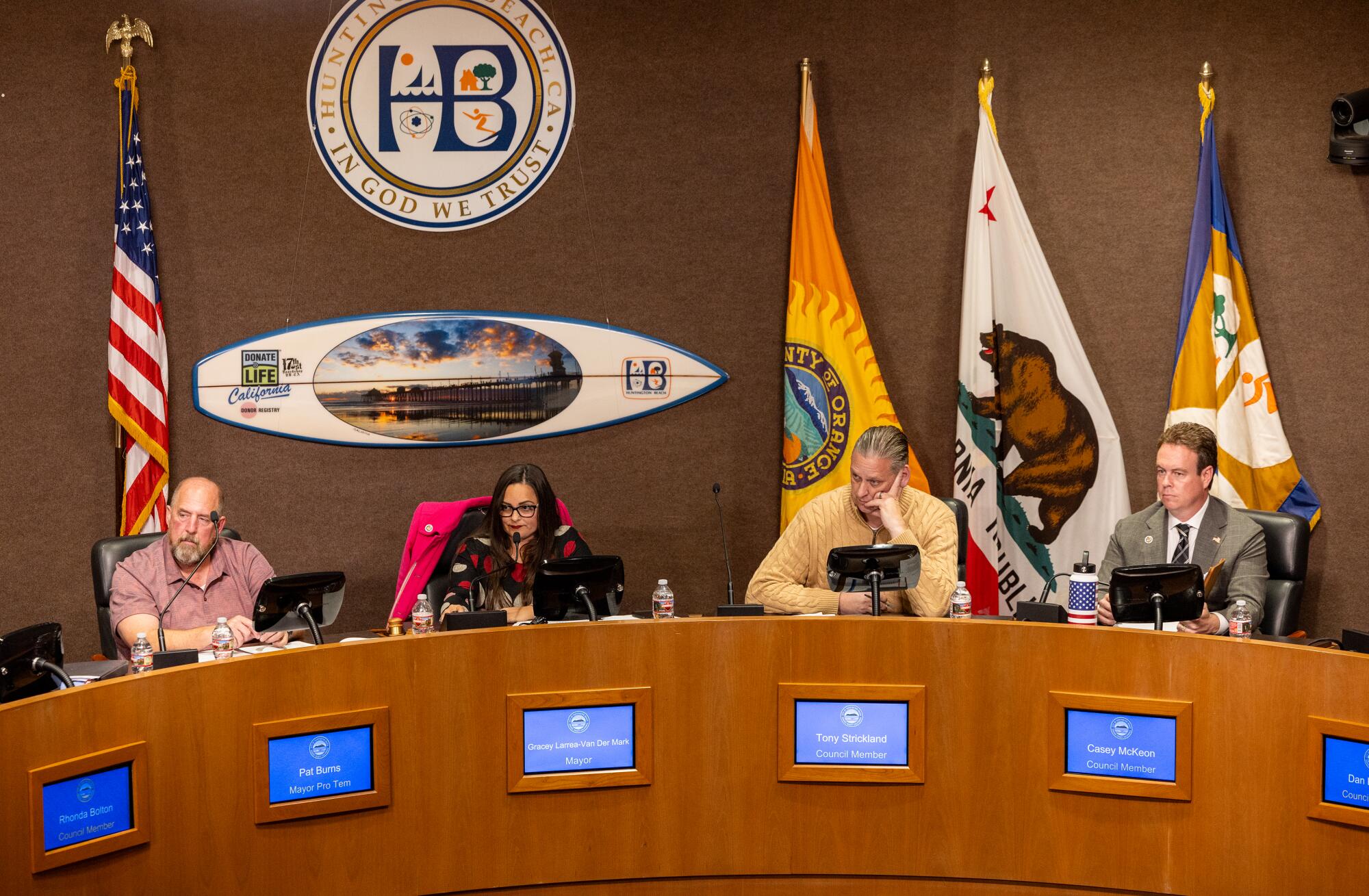
Huntington Beach City Council members listen to comments about the proposed City Charter amendments, which voters approved.
(Allen J. Schaben / Los Angeles Times)
Durham recalls his shock when someone at a council hearing in December shouted “pedophile” when he stood to express dismay about the flag ban and other policies. He says he’s also received violent threats on social media.
Garner has attended several hearings with Durham.
“It’s hard to hear this kind of rhetoric from people who I consider to be my neighbors, a part of my community,” Garner says.
Other groups have responded to the hostility in their own ways. Viet Rainbow of Orange County, an organization focused on “equity, healing, joy and social justice” that serves the Asian American community, has organized “Know Your Rights” workshops for LGBTQ+ students and promoted self-defense and personal safety training on its Facebook page.
Like many who’ve felt compelled to speak out against hate, Durham said he never intended to become a voice for LGBTQ+ rights in Orange County. In the few years since he transitioned, he has mostly kept his life journey to himself, because he knows that not everyone embraces transgender Americans.
“I stayed in the closet long, long after I knew I was trans — for over a decade,” he says. “I didn’t want to lose friends. I didn’t want to lose family. When I came out, I did lose friends. I sent my family a letter, and they just went radio silent.”
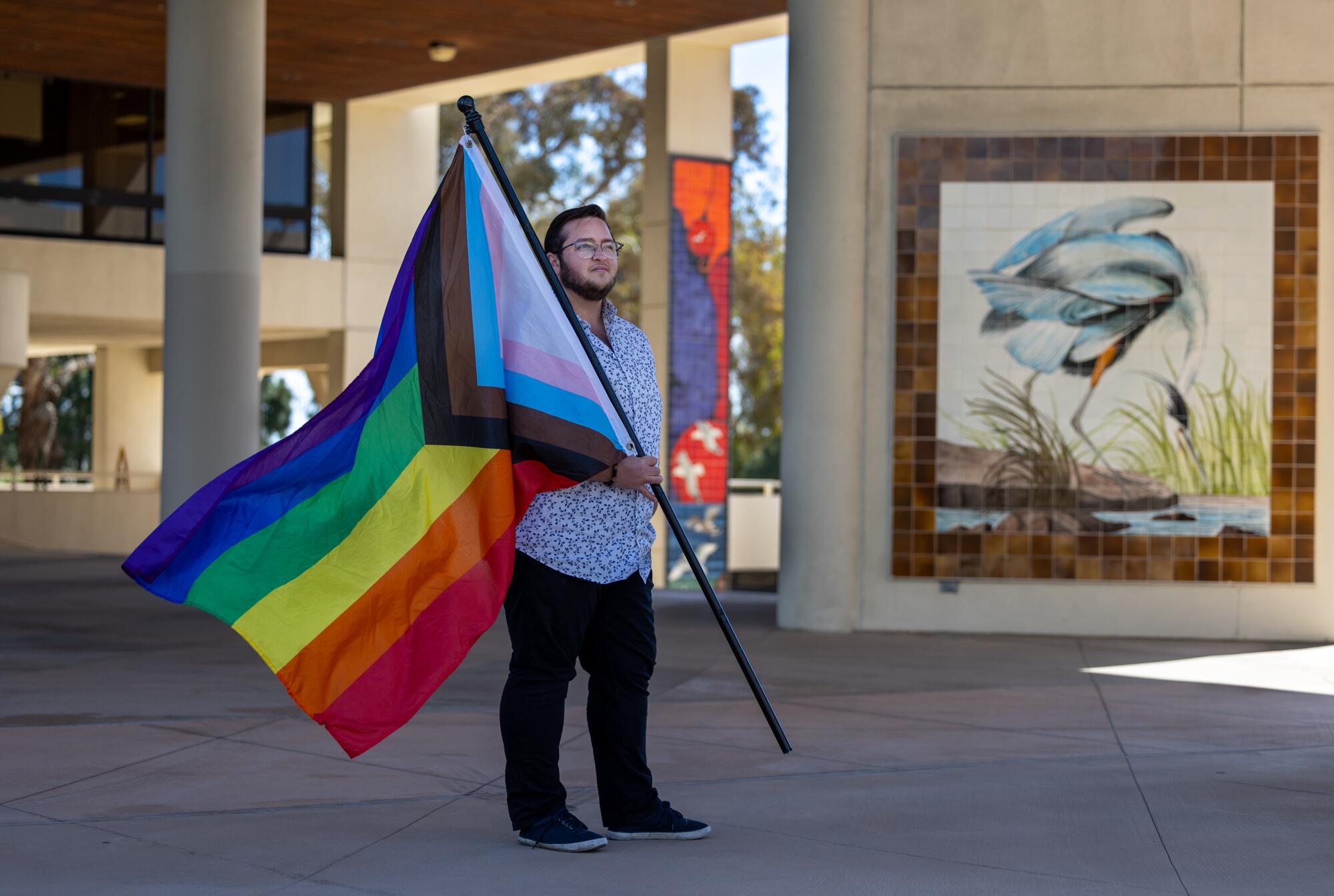
Durham says the city’s decision to bar displaying the rainbow flag serves as a reminder of how unwelcoming parts of Orange County can be for LGBTQ+ people.
(Allen J. Schaben / Los Angeles Times)
Durham came to know Huntington Beach while growing up in the Bay Area. His family visited twice a year to spend time with relatives.
“I saw how wonderful Orange County can be, and I fell in love with it,” he says. “I really think the majority of people who live here are not hateful.”
He points to the fact that in 2021, the city took steps to embrace the LGBTQ+ community, most notably by flying the rainbow flag on city property during Pride Month.
The conservative majority that voters elected to the City Council in 2022 ushered in a dramatic shift — approving, for example, the creation of a parent advisory board to screen children’s books for sexually explicit content and block the purchase of new publications that members deem inappropriate.
Council members who back the library measure have said they are only trying to protect children.
While the harsh words of supporters have attracted the most attention, many residents who’ve spoken out at recent hearings have voiced opposition.
“On one hand, we have more allies in Orange County than ever before, which equates to affirming neighborhoods, businesses, schools and employers,” says Peg Corley, executive director of LGBTQ Center Orange County, a nonprofit advocacy and community service organization in Santa Ana.
“On the other hand, there are pockets of Orange County, like Huntington Beach, where the City Council majority is focused on turning back the clock to the 1950s,” she said.
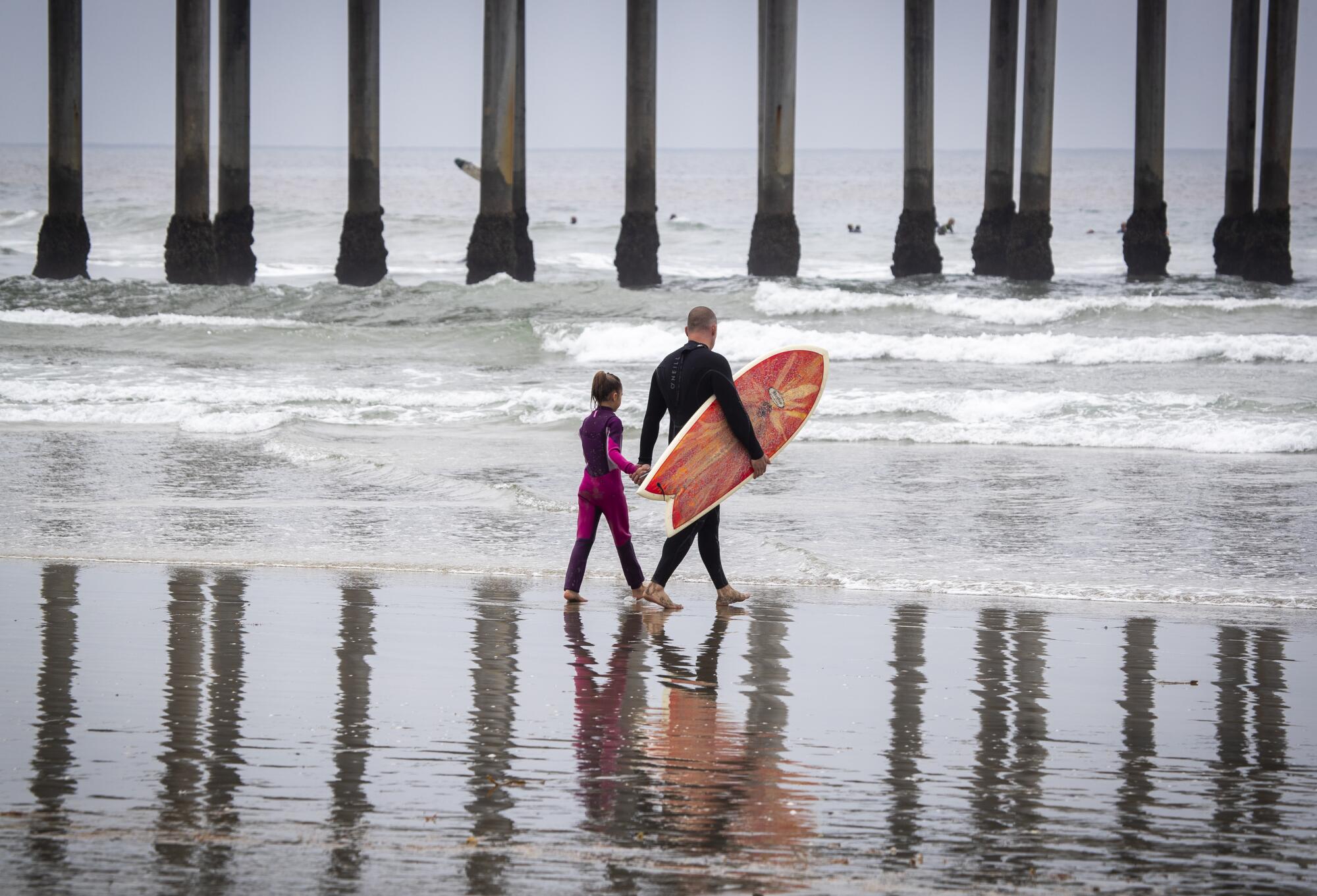
A scene on Huntington Beach in 2020.
(Allen J. Schaben / Los Angeles Times)
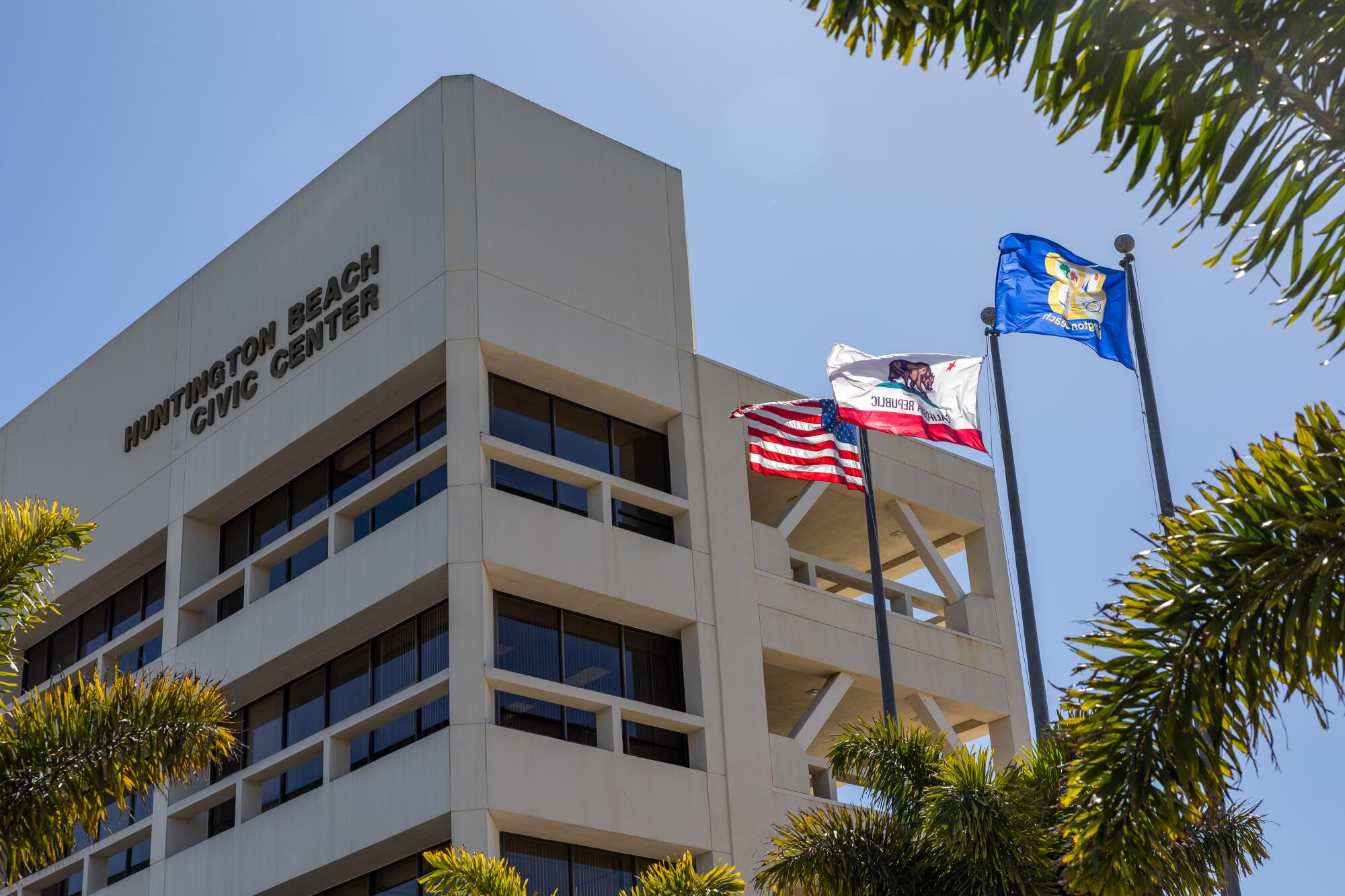
Only federal or state flags can be flown on city property in Huntington Beach.
(Allen J. Schaben / Los Angeles Times)
Corley says the overriding message the council has sent to queer residents, workers and visitors over the last year is, “Go spend your LGBTQ+ dollars somewhere else.”
Durham says Pride at the Pier won’t give up.
Building on the momentum generated by its events last year, the group plans to host its second Pride celebration later this year on the Huntington Beach waterfront. Durham says there are plans to hire extra security to make those who attend feel safe.
Standing outside City Hall, Durham unfurls his own rainbow flag, which is so big it billows around him while he talks about the need to get more people involved in the fight to protect LGBTQ+ rights and freedoms in Orange County.
“We cannot get past this point in our history without joining hands with as many people as possible,” Durham says.
“This is about more than a piece of fabric.”

Politics
Hunter Biden attends pre-trial hearing in Delaware court on federal gun charges

Hunter Biden arrived at a Delaware court just before noon Friday for a pre-trial hearing on federal gun charges, after multiple failed attempts by the first son to have charges brought against him dismissed.
Hunter Biden pleaded not guilty to federal gun charges in the U.S. District Court for Delaware, after Special Counsel David Weiss charged him with making a false statement in the purchase of a firearm; making a false statement related to information required to be kept by a licensed firearm dealer; and one count of possession of a firearm by a person who is an unlawful user of or addicted to a controlled substance.
Judge Maryellen Noreika will preside over the trial, which is set to begin on June 3.
HUNTER BIDEN PLEADS NOT GUILTY TO FEDERAL GUN CHARGES OUT OF SPECIAL COUNSEL DAVID WEISS’ PROBE
With all counts combined, the total maximum prison time for the charges could be up to 25 years. Each count carries a maximum fine of $250,000, and three years of supervised release.
According to the indictment, Hunter Biden bought a Coldt Cobra revolver on Oct. 12, 2018, and “knowingly made a false and fictitious written statement, intended and likely to deceive that dealer with respect to a fact material to the lawfulness of the sale of the firearm… certifying he was not an unlawful user of, and addicted to, any stimulant, narcotic drug, and any other controlled substance, when in fact, as he knew, that statement was false and fictitious.”
Hunter Biden departs a House Oversight Committee meeting at Capitol Hill on January 10. On Friday, a judge denied a motion to throw out a federal gun case against him. (Kent Nishimura/Getty Images)
HOUSE GOP CLAIMS HUNTER BIDEN LIED UNDER OATH MULTIPLE TIMES DURING CONGRESSIONAL DEPOSITION
The indictment also charges Hunter Biden for possessing that firearm — which was “shipped and transported in interstate commerce” — for nearly a week despite being addicted to narcotics.
Fox News first reported in 2021 that police had responded to an incident in 2018, when a gun owned by Hunter was thrown into a trash can outside a market in Delaware.
A source with knowledge of the Oct. 23, 2018, police report told Fox News that it indicated that Hallie Biden, who is the widow of President Biden’s late son, Beau, and who was in a relationship with Hunter at the time, threw a gun owned by Hunter in a dumpster behind a market near a school.
HUNTER BIDEN TAX TRIAL POSTPONED TO SEPTEMBER
Hallie Biden may be required to testify during Hunter Biden’s trial.
A firearm transaction report reviewed by Fox News indicated that Hunter purchased a gun earlier that month.
On the firearm transaction report, Hunter answered in the negative when asked if he was “an unlawful user of, or addicted to, marijuana or any depressant, stimulant, narcotic drug, or any other controlled substance.”
Hunter was discharged from the Navy in 2014 after testing positive for cocaine.
Meanwhile, Weiss also brought federal tax charges against Hunter Biden in U.S. District Court for the Central District of California.
IRS WHISTLEBLOWER SHAPLEY SAID HE ‘COULD NO LONGER PURSUE’ HUNTER BIDEN SUGAR BROTHER KEVIN MORRIS DUE TO CIA
Biden pleaded not guilty to those charges — specifically, three felonies and six misdemeanors concerning $1.4 million in owed taxes that have since been paid. Weiss alleged a “four-year scheme” when the president’s son did not pay his federal income taxes from January 2017 to October 2020 while also filing false tax reports.
On Wednesday, Judge Mark Scarsi heard arguments during a pre-trial hearing in California. That criminal trial was scheduled for June 20, but Hunter Biden’s attorneys requested to delay the trial.
Scarsi sided with Hunter Biden’s attorneys, and moved the tax trial from June 20 to September 5, when jury selection will begin.
Politics
Granderson: Bring on the cannabis cafes, California. Our nation needs them
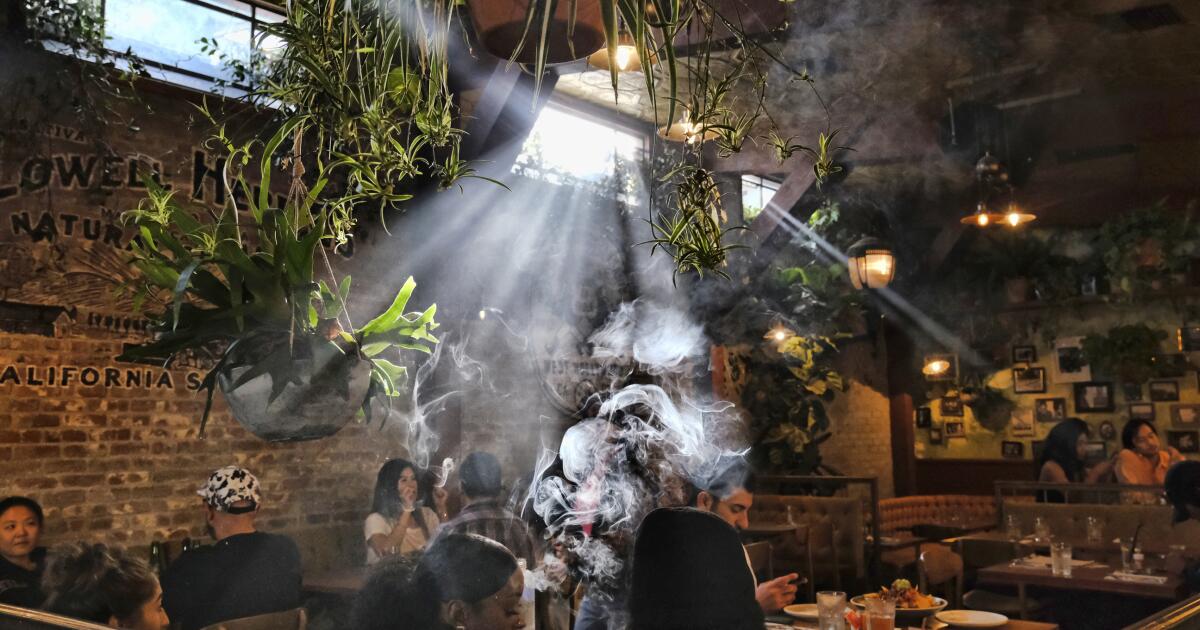
More Americans now consume marijuana on a daily basis than drink alcohol every day, according to a recent study.
That’s welcome news for an industry that has been unfairly demonized by opportunistic politicians since the days of Nixon. The findings — based on data gathered between 1979 and 2022— are consistent with the wave of decriminalization under state laws, notably with California’s Proposition 215 back in 1996.
Opinion Columnist
LZ Granderson
LZ Granderson writes about culture, politics, sports and navigating life in America.
After the election that year, a law professor at Loyola was quoted in the Los Angeles Times as saying “this may be the baby boomers taking control.”
It wasn’t the boomers prevailing, but pragmatism.
About 1.3 million people in the U.S. are in state prisons. The most common reason for incarceration? Drug-related crimes. Given how much the country with the highest prison population loves pot, it makes sense to stop throwing people in jail for doing weed.
Today the only states where cannabis is totally illegal are Idaho, Kansas, South Carolina and Wyoming. Earlier this month President Biden announced plans to reclassify pot as a less dangerous drug.
In short: “Just say no” is dead. Long live “pass the dutchie ’pon the left-hand side.”
The next important step in having policy actually reflect society would be for Gov. Gavin Newsom to sign the “munchie bill” that’s likely to be headed his way soon.
Last year Assembly Bill 374 — which would make it legal for dispensaries to become cafes and offer food as well as host live events — passed the Assembly 66-9 and the Senate 33-3.
Surprisingly, Newsom vetoed the bipartisan bill in October, citing concerns about providing a smoke-free work environment for employees. That seems nonsensical, considering that it is already legal to consume marijuana in California dispensaries. AB 374 would have just made it possible to buy a bag of chips while you do it.
Marijuana cafes have existed in Amsterdam since the 1970s. Last summer I spent a few hours listening to music and eating homemade desserts at the first marijuana cafe in North America. Fittingly called New Amsterdam Cafe, the popular hangout opened in Vancouver in 1998 and is as chill as Issa Rae’s Hilltop Coffee.
However, vibes are not the only reasons Assemblymember Matt Haney (D-San Francisco) introduced AB 374. For him it’s also a matter of fairness and trying to level the playing field.
“Small businesses have to follow every rule, and yet you’re telling them they can’t adapt and innovate and offer something people want,” he said. “The ones who follow the rules should be able to offer an experience. People pay a lot to sit in a winery. We have cigar lounges. This is really no different.”
Despite law enforcement’s best efforts, illegal pot is estimated to have pulled in more than $8 billion in 2020 compared with $4 billion for legal. However, it’s the small-business owners who also have the burden of taxes, regulations and fines. All of which eats away at profits and businesses’ ability to grow. Haney said his proposal not only would allow small business owners to diversify their income stream, but also would encourage people to come out of their post-pandemic cocoons and socialize again.
California began liberating cannabis culture in 1996. It’s only right the state continues to correct a narrative that was born not from science but from President Nixon’s prejudice. It’s because of that cloud hanging over cannabis that advocates of decriminalization had to sweeten the deal for voters by promising a financial windfall for the state, which of course is why legal pot is ridiculously overtaxed.
Haney said he knows the cafes won’t solve all of the problems that dispensary owners face because of competition from the black market, but it would at least provide owners with more ways to make money. Haney said he worked with both Newsom’s office and the Department of Cannabis Control before reintroducing the bill. He said the new version, AB 1775, addresses the governor’s concern for the work environment, and it also has union support. It recently passed the Assembly 49-4 and is headed to the Senate.
My hope is that the munchie bill meets Newsom’s approval. With proper ventilation for employees and customers alike, marijuana cafes could provide local artists with new venues and add another branch of tourism.
“I’m one of the younger legislators, and I see how excited my friends are,” 42-year-old Haney told me. “I have a couple of colleagues who represent suburban districts and one came to me and said, ‘All the suburban moms are excited about your cannabis cafe bill.’ Post-pandemic, it’s been hard to get people to get out, and I think this just makes sense.”
It really does.
Politics
Trump’s Pattern of Sowing Election Doubt Intensifies in 2024

Former President Donald J. Trump has baselessly and publicly cast doubt about the fairness of the 2024 election about once a day, on average, since he announced his candidacy for president, according to an analysis by The New York Times.
Though the tactic is familiar — Mr. Trump raised the specter of a “rigged” election in the 2016 and 2020 cycles, too — his attempts to undermine the 2024 contest are a significant escalation.
A line chart shows the number of times Donald J. Trump cast doubt on the fairness or integrity of the election during the 2016, 2020, and 2024 election cycles. The line for 2024 shows that Trump started casting doubt months earlier during this election cycle and has made hundreds more statements than in past elections. Three videos on the chart show early instances of Trump casting doubt, in 2016, 2019 and 2022.
Mr. Trump first raised questions about the 2016 election in August of that year, about 100 days before the election. He did so earlier — and more frequently — before the 2020 election.
But in the 2024 cycle, the falsehoods have been baked in since Mr. Trump announced his candidacy, almost two years before Election Day. They show no signs of subsiding.
Mr. Trump’s refusal to accept the results of the 2020 election had historic consequences. The so-called “Big Lie” — Mr. Trump’s false claim that the election was stolen from him — led to the Jan. 6, 2021, insurrection at the United States Capitol and two of four criminal indictments against Mr. Trump, as well as his second impeachment.
But Mr. Trump had planted seeds of doubt among his followers long before Election Day, essentially setting up a no-lose future for himself: Either he would prevail, or the election would be rigged.
He has never given up that framing, which no evidence supports, even well after the end of his presidency. And as he seeks to return to the White House, the same claim has become the backbone of his campaign.
Long before announcing his candidacy, Mr. Trump and his supporters had been falsely claiming that President Biden was “weaponizing” the Justice Department to target him. But it took until March of last year for Mr. Trump to settle on a new accusation: that the multiple legal challenges related to Mr. Trump’s business and political activities constituted a “new way of cheating” in order to “interfere” in the 2024 election. He has made versions of that accusation more than 350 times.
“This is a rigged deal, just as the 2020 election was rigged, and we can’t let them get away with it,” Mr. Trump said on Nov. 18, 2022, three days after announcing his 2024 candidacy. His comments were in response to Attorney General Merrick B. Garland’s appointment of a special counsel to supervise the Justice Department’s criminal investigations related to the events leading up to the Jan. 6 riot and Mr. Trump’s decision to keep classified documents at his Florida resort.
By last summer, Mr. Trump had honed the language and made it a staple of his stump speech: “They rigged the presidential election of 2020, and we’re not going to allow them to rig the presidential election of 2024.”
The Times has documented more than 500 campaign events, social media posts and interviews during the 2024 cycle in which Mr. Trump falsely accused Democrats or others of trying to “rig,” “cheat,” “steal” or otherwise “influence” the next election — or of having done so in 2020.
‘Election interference’ is Trump’s choice accusation in 2024 cycle
Mr. Trump has adapted the specifics of his accusations with each of the three election cycles. But in each case, his pattern of discourse has followed the same contours. He sows doubt about the legitimacy of the election, and then begins to capitalize on that doubt by alluding to not necessarily accepting the election results — unless, of course, he wins.
This rhetorical strategy — heads, I win; tails, you cheated — is a beloved one for Mr. Trump that predates even his time as a presidential candidate. He called the Emmy Awards “a con game” after his television show “The Apprentice” failed to win in 2004 and 2005. And before he officially became the Republican presidential nominee in 2016, he began to float the possibility that the primary contest was, as he said, “rigged and boss controlled.”
By May of that year, Mr. Trump spoke plainly about why he had stashed the argument away. “You’ve been hearing me say it’s a rigged system,” he said, “but now I don’t say it anymore because I won.”
Late that summer, with his sights set on the November general election, Mr. Trump tested out a new line, contending that “the media” was “rigging” the election in favor of Hillary Clinton, the Democratic nominee. His assertions intensified in October after a recording surfaced of him speaking in vulgar terms about women.
“I will totally accept the results of this great and historic presidential election — if I win,” Mr. Trump said at a rally in 2016, three weeks before Election Day. And though he would end up winning the Electoral College and the presidency, his failure to secure the popular vote led him to form a Presidential Advisory Commission on Election Integrity to “prove” that rampant voter fraud was to blame.
In December 2019, well into Mr. Trump’s re-election campaign, the Democratic-led U.S. House of Representatives impeached him, saying he used the levers of government to solicit election assistance from Ukraine in the form of investigations to discredit Mr. Biden. Mr. Trump subsequently said that Democrats were using the “impeachment hoax” to “interfere” in the election.
The Covid-19 pandemic gave him a new rallying cry, centered on election integrity: Mail-in ballots were “dangerous,” “fraught with fraud” and were being used to “steal” and “rig” the election, he said.
About six weeks before Election Day in 2020, Mr. Trump refused to commit to a peaceful transfer of power. “We want to make sure that the election is honest, and I’m not sure that it can be,” Mr. Trump said.
This time, it was half a year before Election Day 2024 — and after more than a year of pushing the “election interference” line about the criminal charges against him and repeatedly warning that Democrats are “cheating” — that Mr. Trump again placed conditions on his acceptance of election results.
“If everything’s honest, I’ll gladly accept the results,” he said in a May 1 interview with The Milwaukee Journal Sentinel. “If it’s not, you have to fight for the right of the country.”
-

 Politics1 week ago
Politics1 week agoSouthern border migrant encounters decrease slightly but gotaways still surge under Biden
-

 Politics1 week ago
Politics1 week agoDem newcomer aims for history with primary win over wealthy controversial congressman
-

 World1 week ago
World1 week agoSlovakia PM Robert Fico in ‘very serious’ condition after being shot
-

 News1 week ago
News1 week agoSmall but mighty Nimble becomes first mixed-breed dog to win Westminster agility title
-

 Politics1 week ago
Politics1 week agoVulnerable Dem incumbents move to the center in key swing states as Biden panders to far-left base
-

 World1 week ago
World1 week agoCanadian Nobel-winning author Alice Munro dies aged 92
-

 World1 week ago
World1 week ago‘Monstrous crime’: World reacts to attack on Slovakia’s prime minister
-

 News1 week ago
News1 week agoHow a migrant aid group got caught up in a right-wing social media thread : Consider This from NPR


